特集
Let's meet people in Kamikatsu vol.4 Naoko Yagi
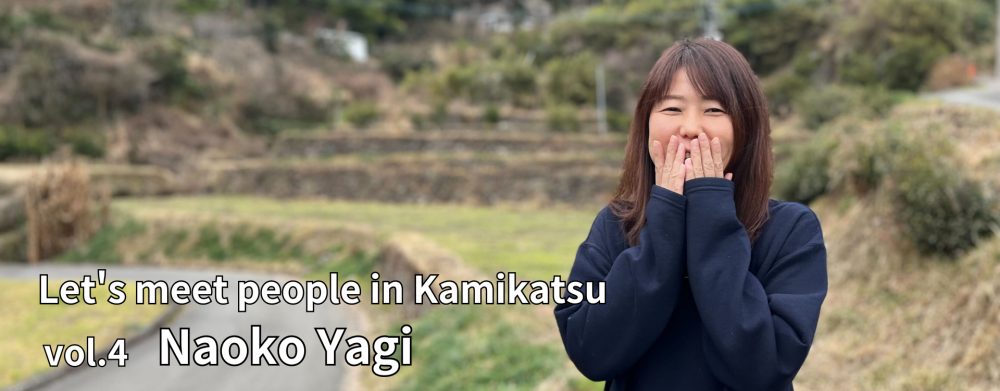
Kamikatsu Town, in Tokushima Prefecture, was the first municipality in Japan to make a zero-waste declaration in 2003.
Each household uses composting for food scraps. Other garbage is brought to the town's zero-waste center by the residents themselves and sorted into 45 separate categories, resulting in a recycling rate of over 80%.
But Kamikatsu has other characteristics and attractions besides their “zero-waste” related activities.
There are many places, experiences, and tours that allow visitors to fully experience and enjoy the town's nature and culture.
The key factor is the "people" of Kamikatsu. Here are some of the people who are the lifeblood of Kamikatsu and who make the region more attractive.
Text/Yuuki Bando (National Government Licensed GuideInterpreter)
In Vol.4, we introduce Ms. Naoko Yagi, who runs "Shinobu-chan's Bancha Tea Shop." She moved to Kamikatsu in 2018 and became very fascinated with Awa Bancha.She has been sellingthe tea, and in addition, she offers Bancha tea tasting experiences at "tea parties" to convey its appeal. However, Ms. Yagi has something else she would like to introduce more than Bancha tea. This interview tells you what it is.
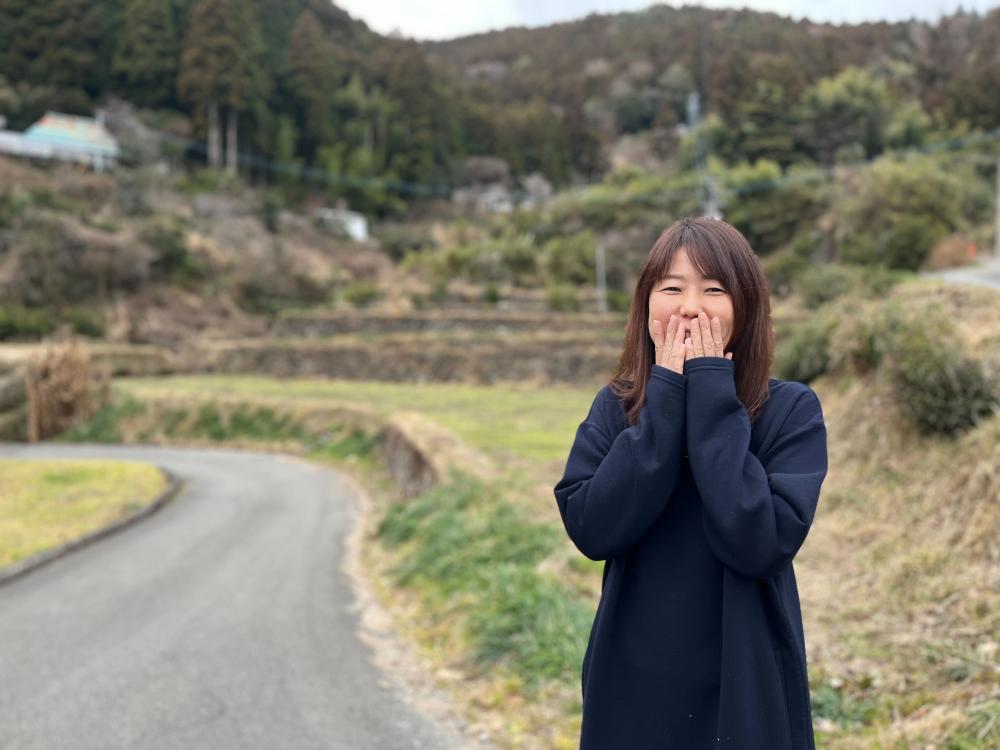
“Don't worry about the rituals or details," she said, “there is no etiquette or manner to follow when drinking it. Awa Bancha in Kamikatsu is to be brewed and drunk casually.”
She lightly brews tea one after another right in front of the participants at the tea party. She speaks without any stiffness, and the tension of everyone in their seats dissipates and their faces become more relaxed.
Ms. Yagi, better known by her nickname "Shinobu-chan," holds a Kamikatsu Awa Bancha tasting experience called a "Tea Party," where she brews about six or seven different types of Awa Bancha from different farmers. She introduces each tea's characteristics on a screen with the farmers' smiling faces. And the characteristics of each tea are explained in simple and easy-to-understand sommelier-like words (but unpretentious). As we sipped each cup of tea with the prepared tea sweets, we realized that each tea has its own unique features. It is truly a luxurious time to enjoy the unique teas of Kamikatsu in a relaxing atmosphere.
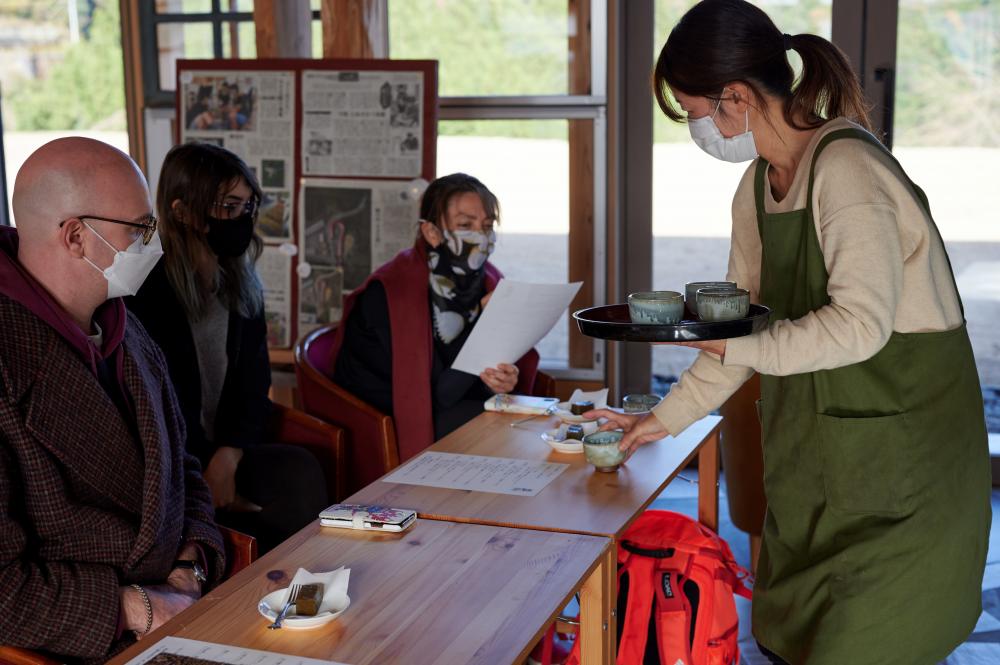
This tea party has no set dates or times. “If you ask me for a certain date, time, and place, I will go wherever is convenient for you," she says. "Shinobu-chan's Bancha Tea Shop," as run by Ms. Yagi, has never actually had a physical store, but only exhibits at events, sells online, and wholesales at some farmers’ markets. She sells tea leaves that she purchases from about 10 Bancha tea farmers in Kamikatsu. This tea-tasting experience is a new program started in 2021.
For the tea party, Ms. Yagi herself brings her own tea utensils and showcases, and a corner of any space instantly becomes "Shinobu-chan's Bancha Tea Shop.”
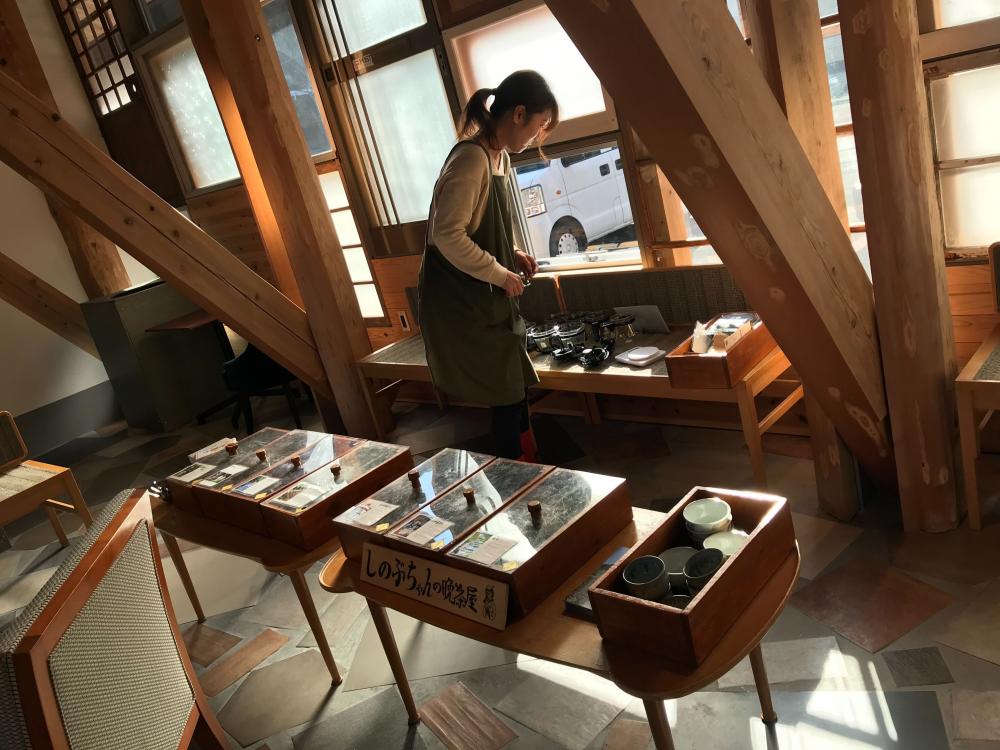
But Ms. Yagi's work is not limited to selling tea and holding tea parties. She helps Awa Bancha farmers in Kamikatsu, who are now suffering from a labor shortage. She supports picking tea leaves and is involved in everything from fermentation to drying the leaves in the sun and even shipping.
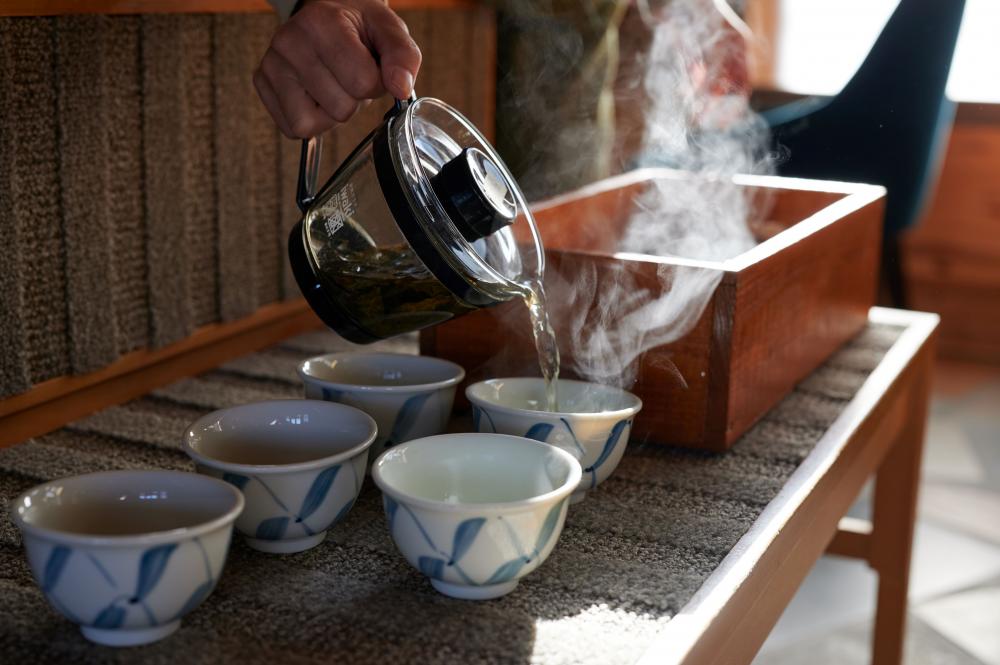
To begin with, what kind of tea is "Awa Bancha"?
It is a post-fermentation tea made in the mountains of Tokushima Prefecture, which uses lactic acid fermentation and is rare in most parts of the world. Its archaic tea-making method was registered as a National Important Intangible Folk Cultural Property in 2021.
This golden tea, with its distinctive aroma and refreshing sourness, has been handed down from generation to generation in Kamikatsu for private use. The process is unique: the plucked tea leaves are boiled, crumpled, soaked in a vat, and then dried in the sun. Almost everything is done by hand, from picking to bagging, and it is interesting to note that the flavor and taste varies from year to year and from person to person. Because it is made for family use, it is not widely available on the market and its production is limited. That meansit is not a tea that can be found anywhere.
So, how did Ms. Yagi encounter this Awa Bancha?
“Originally, I had no interest in farming at all, and didn’t know anything about tea. In 2018, I moved to Kamikatsu because my then-partner got a job. However, I had no job, so I was very bored... I wanted to do some work related to the community, so I helped picking Bancha tea in June and July. Then, I started to get to know the people of Kamikatsu. That was the first time I felt like I had 'stepped into Kamikatsu.’”
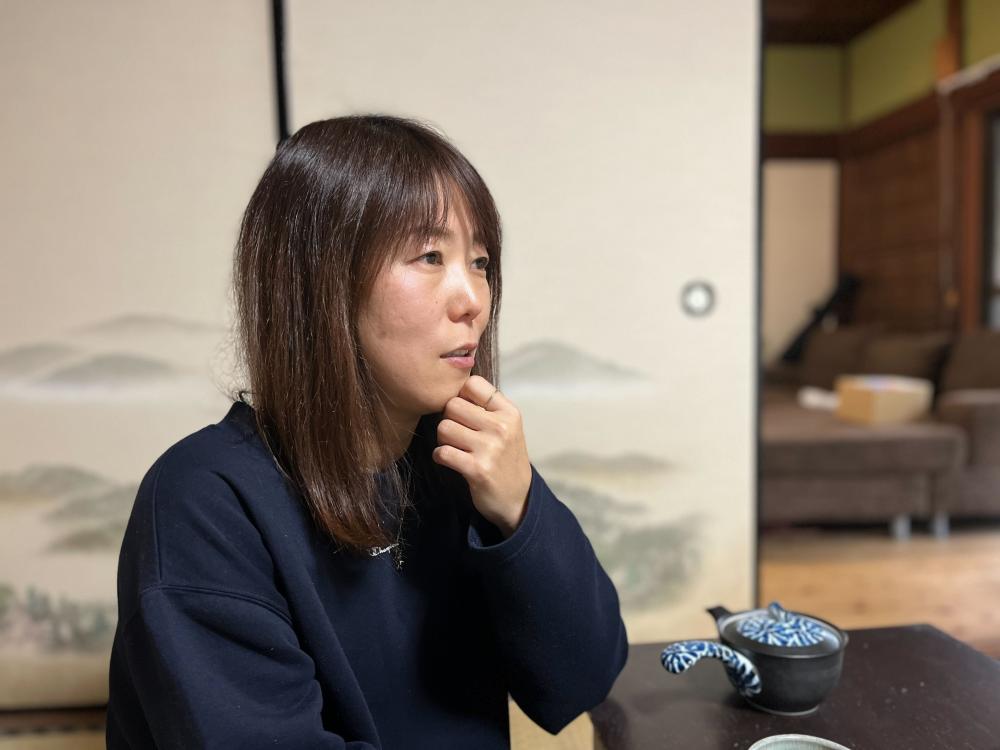
Ms. Yagi was born and raised in Kyoto. In fact, she was not fond of Awa Bancha, which has a unique flavor, at first. But the tea that people living in Kamikatsu drink on a daily basis is not green tea, barley tea, or hojicha. It is always the Awa Bancha tea made in Kamikatsu. Ms. Yagi's daily tea has naturally changed to Awa Bancha.
“What I found attractive was not the taste of Awa Bancha or its unusual production method. I was envious of the fact that the culture of tea has taken root in Kamikatsu. Tea farmers and even those who are not tea farmers have Awa Bancha tea as a common language. The soul, or the everyday life of the people who live in Kamikatsu is always rooted in Awa Bancha tea. I wanted to learn that common language.”
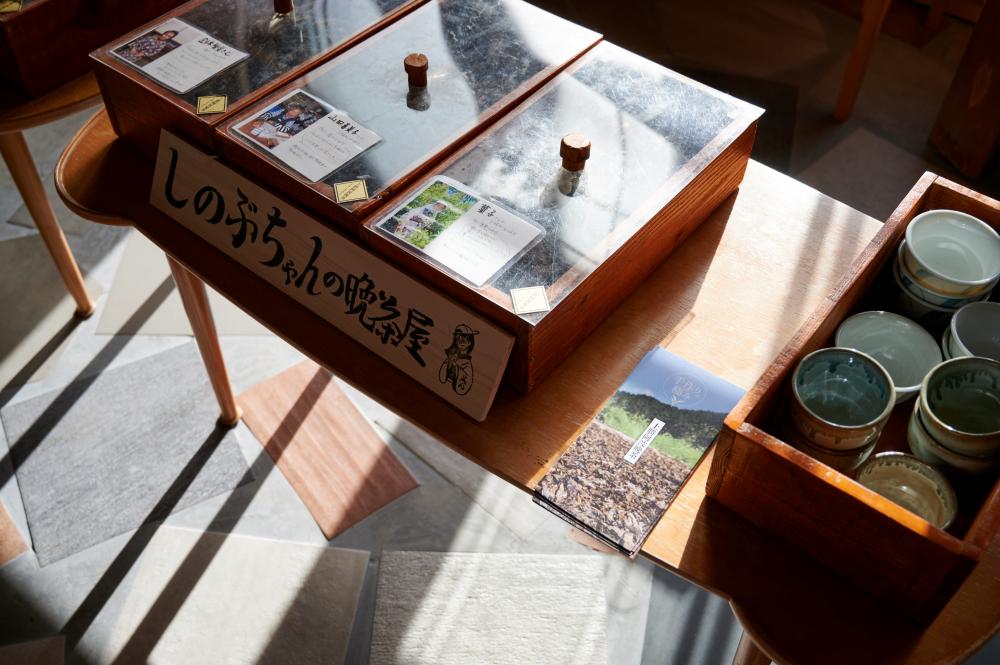
Ms. Yagi was involved in the “3rd Annual Kamikatsu Awa Bancha Festival” held in the fall of 2018 as a volunteer staff member. She enjoyed being able to participate in the event with local people. From there, she got more and more involved in the world of Awa Bancha tea. She became friends with Bancha tea farmers and learned more about Kamikatsu's Awa Bancha by being taught about other tasks besides tea picking. The following year, in November 2019, at the "Kamikatsu Autumn Appetite Fest" event held in Kamikatsu. She came up with the ideato “sell the Bancha tea she was involved in on behalf of the farmers.”
“At first, I wanted to make it "Shinobu-chan’s ‘solo’ Tea Festival" (laughs). I just wanted to bring together and showcase the teas of Bancha tea farmers that I have become friends with. The organizer of the food festival was a friend of mine, but I wrote a proposal about what I wanted to do and why I wanted to sell Bancha tea and presented it to him. And from exhibiting at this event, "Shinobu-chan's Bancha Tea Shop," which offers tastings and sells tea leaves, got its start.
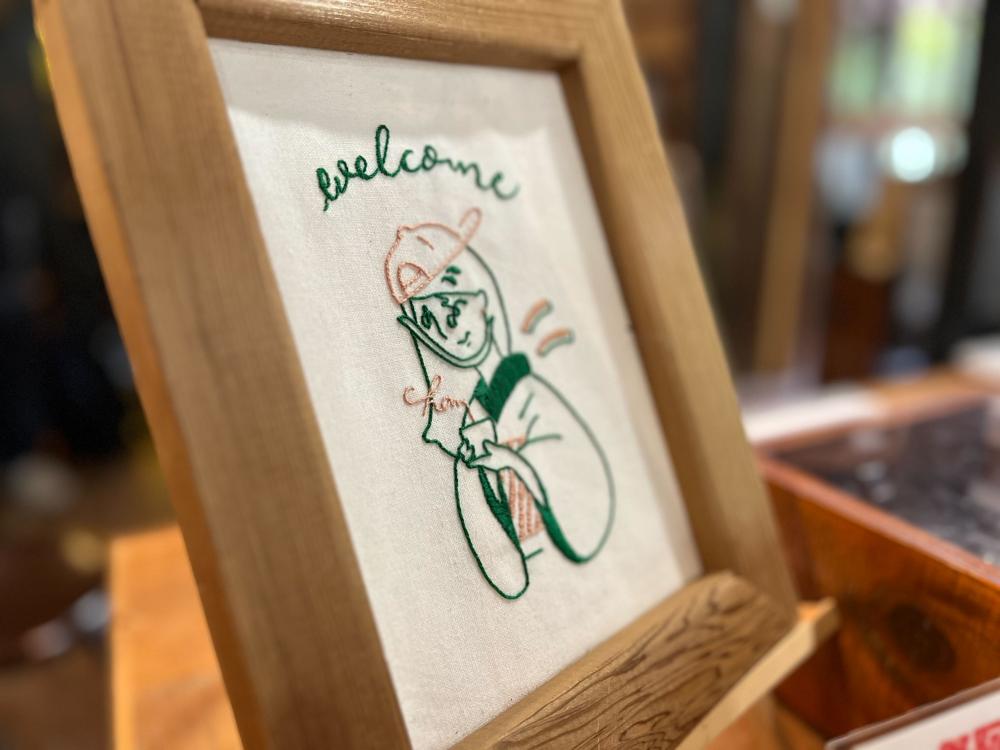
Four years have passed since "Shinobu-chan's Bancha Tea Shop" started, and the range of activities is expanding rapidly. However, she is beginning to hear from Bancha tea farmers here and there, "I think this is the last year I will make tea..." She feels sad about this situation, but accepts it as a reality. Picking tea leaves and making Awa Bancha tea in the mid-summer heat is quite hard work. “Giving up tea production" is an unavoidable choice for those who are getting older.
“I want to do something that is not really about 'selling Bancha tea,' but rather 'introducing people who are making Bancha tea in Kamikatsu.’ That's all I want to do. I can't make a big change in the current situation of Bancha tea through my involvement, but I can talk about Awa Bancha tea and the people who are involved with it.” More than just Bancha Tea, she wants to tell the world about the people who make it.
If necessary, the general story and knowledge of tea could be conveyed by anyone who has learned it. But because Ms. Yagi lives in Kamikatsu and is connected to the farmers directly, the Awa Bancha tea she offers is conveyed with fascinating stories. What is being told there is the "people" who have inherited the history, culture, and lifestyle of Awa Bancha tea. Ms. Yagi's stories about Awa Bancha and its farmers, which she tells at tea parties, are very pleasant to listen to. But even in that softness, there is an eloquence backed by her thoughts and feelings.
Awa Bancha is a "common language” in Kamikatsu and is what Ms. Yagi wanted to learn and “speak.” She has not only mastered it, but is now able to manipulate it skillfully. This is a common language that visitors to Kamikatsu should definitely learn, even just a bit. We hope you will enjoy the depth of the language with Ms. Yagi's help.
■ Shinobu-chan's Bancha Tea Shop
https://shinobuchan.shop/
Requests and consultations for Shinobu-chan's tea party (Kamikatsu Awa Bancha Tea Tasting Experience) can be made through DMs on SNS
https://www.instagram.com/shinobuchan.bancha/


